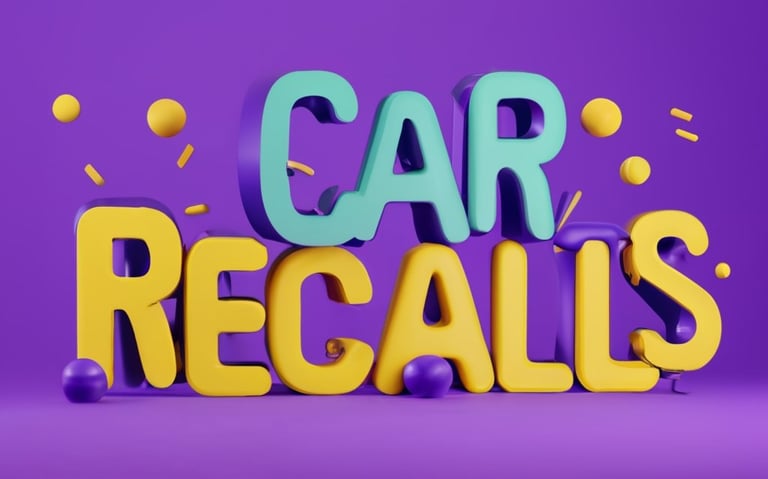Is Your Car Recalled? Don't Get Stuck on the Side of the Road!
Attention Drivers!
Is Your Car on the Recall List?
Don't Get Stranded (or Worse!)
Putting the brakes on potential dangers: Car recalls are more than just an inconvenience. They're a critical safety measure to address hidden issues that could put you and your loved ones at risk.
Is your car harboring a secret? Manufacturers sometimes identify problems after a vehicle is already on the road. These issues can range from faulty parts that compromise performance to serious safety hazards.
Don't wait to find out! This blog post dives deep into car recalls, explaining what they are, why they happen, and most importantly – how to check if your car is affected. Plus, we'll guide you through the simple steps to get your vehicle fixed, free of charge!


Why Ignoring Car Recalls Could Cost You More Than Just Money (and Maybe Even Your Life!)
Car recalls sound scary, but knowledge is power, especially when it comes to your safety. Understanding why recalls happen can literally be a lifesaver.
This article will take you from "clueless car owner" to "recall master" in minutes! We'll break down the reasons behind recalls, from factory flubs to hidden dangers, and show you exactly how to check if your car is at risk.
Plus, we'll expose the shocking truth about what can happen if you ignore a recall (hint: it's not just a minor inconvenience!). We'll even explore real-world examples to show you why taking action is crucial.
Ready to transform from scared driver to safety superhero? Buckle up and let's get started!

Reasons Behind Car Recalls: Protecting Drivers and Passengers
Car recalls might seem like a hassle, but they play a crucial role in keeping drivers and passengers safe on the road. Let's take a closer look at the reasons behind these recalls:
Manufacturing Defects: Uncovering Flaws in the Making
Manufacturing defects occur during the car-making process. Imagine a car's brakes that don't work properly or airbags that might not deploy when needed. These flaws pose significant risks to everyone in the vehicle. When car manufacturers discover such issues, they issue recalls. These recalls are like safety nets, ensuring that cars with these defects are fixed before they cause accidents or harm.
Safety Concerns: Prioritizing Your Well-being
Safety concerns are a top priority for car manufacturers. Even with rigorous testing, unforeseen problems can arise. It could be a faulty seatbelt, an airbag that doesn't inflate correctly, or tires prone to bursting. Anything that compromises your safety is taken very seriously. When these concerns are identified, recalls are issued to address the problems promptly. By doing so, manufacturers are working hard to prevent accidents and protect the lives of drivers and passengers.
Regulatory Compliance: Meeting Legal Standards
Car manufacturers must follow specific rules and standards set by the law. These regulations cover various aspects, such as emissions, vehicle performance, and safety features. If a car doesn't meet these legal requirements, it can lead to recalls. Regulatory compliance recalls ensure that cars meet the necessary legal standards, ensuring that your vehicle is not just safe but also follows the law.
Understanding these reasons behind recalls is essential. It highlights the efforts made by car manufacturers to keep you safe. In the next sections, we'll explore how you can check if your vehicle is affected by a recall, the steps to take for a quick resolution, and real-life examples of recalls and their impact. Stay tuned to learn more about how you can stay informed and make sure your vehicle is always road-worthy and secure.


Identifying If Your Vehicle Is Affected
Signs to Look For: Recognizing Potential Issues
Keeping an eye out for signs that your car might have a problem is the first step. Unusual noises, strange odors, or a change in how your car handles could indicate an issue. Additionally, pay attention to any official notices or letters from the manufacturer. Sometimes, they'll send notifications directly to your mailbox if your vehicle is part of a recall.
Utilizing VIN (Vehicle Identification Number): Unlocking Recall Information
Your car has its own unique identity code known as the Vehicle Identification Number (VIN). This number is like your car's fingerprint and can be used to check for recalls. You can usually find the VIN on the dashboard, near the windshield. By entering your VIN into specific websites or apps provided by the manufacturer or government agencies, you can instantly find out if your vehicle is affected by a recall.
Online Resources and Databases: Accessing Reliable Information
The internet is a treasure trove of information. Many reliable websites and databases are dedicated to car recalls. Government websites and car manufacturer sites often provide updated and accurate recall information. Stay away from unofficial sources and rely on trusted platforms to get the right details about recalls affecting your vehicle.
Taking Necessary Steps
Contacting the Manufacturer: Seeking Confirmation
If you suspect your car might be part of a recall, don’t hesitate to contact the manufacturer. They have customer service hotlines and email addresses specifically set up to address these concerns. By reaching out to them, you can confirm whether your vehicle is indeed affected. They can provide you with the necessary details and guide you on the next steps.
Visiting Authorized Dealerships: The Recall Solution Hub
Authorized dealerships play a vital role in the recall process. They have trained technicians who can identify the issue, carry out necessary repairs, and ensure your car is safe to drive. Manufacturers often work closely with these dealerships to handle recall repairs efficiently. When you receive a recall notice, schedule an appointment with an authorized dealership to get your car fixed promptly.
Importance of Prompt Action: Ensuring Your Safety
Recalls are time-sensitive. Ignoring them can lead to serious consequences. The issues identified in recalls are there for a reason – they could jeopardize your safety and the safety of others on the road. By taking prompt action, you're not only ensuring your well-being but also contributing to overall road safety. Don’t delay; address recalls immediately to keep yourself and everyone around you safe. Remember, your quick response can make a significant difference in preventing accidents and maintaining the integrity of your vehicle.


Real-Life Examples and Risks of Unrepaired Recalls:
Learning from the Past
Major Car Recalls: Lessons from History
Looking back at major car recalls provides valuable insights into the significance of these safety measures. One prominent example is the Takata airbag recall, where faulty airbags were linked to several fatalities. This recall highlighted the importance of addressing even seemingly minor issues promptly. Another case is the General Motors ignition switch recall, which resulted in accidents and casualties due to a defect that could turn off the engine while driving. These examples emphasize why recalls are essential—they prevent tragic accidents and save lives.
Stories of Affected Individuals: Real-Life Experiences
Real-life stories carry immense weight in understanding the impact of recalls. One such tale is that of Sarah, whose car was part of a recall due to faulty brakes. She ignored the recall notice, thinking her brakes were fine. Tragically, she experienced brake failure while driving, leading to a severe accident. Sarah's story serves as a stark reminder of the potential consequences of disregarding recalls. Hearing these accounts from real people underscores the importance of taking recalls seriously and acting promptly.
More recent examples
According to CBC.ca, the most recent car recall in Canada involves Hyundai and Kia, where over 600,000 cars are being recalled due to a problem with the anti-lock braking system, which could lead to a fire. This recall includes various models like the Hyundai Accent, Elantra, Genesis Coupe, Santa Fe, Tucson, and Kia Borrego, Forte, Optima, and others. The United States is also affected, with millions more vehicles being recalled. Additionally, the National Highway Traffic Safety Administration (NHTSA) issued recalls for several other popular brands like Toyota, Lexus, Tesla, Honda, Acura, Ford, and Jeep Wrangler. These recalls emphasize the importance of addressing potential safety issues promptly.
As reported by apnews.com, Honda, a renowned car manufacturer, has encountered recent recalls in Canada, prompting heightened concerns regarding vehicle safety. One recall involves almost 300,000 Acura and Honda vehicles due to a faulty fuel pump that poses a risk of engine failure or stalling while driving. Another recall affects 52,000 Hondas in Canada due to defective seat belts. To ensure your vehicle's safety, it's crucial to stay informed about recalls. You can check for any ongoing recalls on your Honda vehicle by calling the number provided in the "Additional Resources" section or using the Honda Recall Checker tool on the official Honda Canada website. Keep in mind that this information is up to date as of December 2023, and for the latest updates, contacting the manufacturer or visiting the NHTSA website is recommended.
Risks of Unrepaired Recalls: Beyond the Surface
Safety Hazards: Ignoring Recalls Can Be Deadly
Ignoring recalls can have dire safety consequences. Imagine driving with a defective airbag that might explode upon deployment or a faulty fuel system that could lead to a fire. These scenarios aren't just hypothetical—they are real risks associated with unrepaired recalls. Your safety, as well as the safety of your passengers and others on the road, is compromised when recalls are disregarded. Addressing recalls promptly is the only way to mitigate these safety hazards and ensure the well-being of everyone on the road.
Legal Implications: Understanding the Consequences
Aside from the immediate safety risks, there are legal implications to consider. If your vehicle is part of a recall, and you choose not to address it, you could be held legally responsible in the event of an accident. Insurance claims might be denied, and legal action could be taken against you for negligence. By ignoring a recall, you not only jeopardize lives but also open yourself up to potential legal consequences that could have long-lasting repercussions.
So, real-life examples and the potential risks associated with unrepaired recalls emphasize the critical importance of heeding recall notices. By understanding the gravity of these situations and learning from past incidents, you can make informed decisions, ensuring your safety and the safety of others on the road. Remember, recalls exist to protect you, your loved ones, and everyone who shares the streets with you. Take them seriously, act promptly, and contribute to making our roads safer for everyone.


Proactive Measures: Ensuring Your Car’s Safety
Regular Vehicle Checks: Your Car's Health Checkup
Your car, like your body, needs regular checkups to stay healthy. Regular vehicle checks are essential to ensure your car's vital components are working properly. Keep an eye on your tires' tread and pressure, check your brakes, and inspect your lights. Simple tasks like these can prevent unexpected issues on the road. Regular maintenance not only keeps your car in top condition but also enhances its overall safety and performance.
Staying Informed: Knowledge Is Power
Staying informed is one of the best ways to protect yourself and your car. Make it a habit to stay up-to-date with recall information. Follow news updates from reliable sources and pay attention to any notifications from your car's manufacturer. Manufacturers issue recalls to fix potential problems, and being aware of these recalls can help you take prompt action, ensuring your safety. Knowledge truly is power when it comes to keeping your vehicle in safe working order.
Advocating for Recalls: Your Voice Matters
Your voice can make a difference in ensuring car safety. If you notice something off with your car that isn't quite right, don't hesitate to speak up. By reporting potential issues to regulatory authorities or the car manufacturer, you're playing a vital role in keeping everyone safe. Your observations might help identify problems early, leading to timely recalls that prevent accidents and injuries. Being an advocate for recalls means being a part of a community that prioritizes safety on the roads.
By taking these proactive measures, you're not only safeguarding your own well-being but also contributing to a safer driving environment for everyone. So, keep those regular checks, stay informed, and don't hesitate to raise your voice if you suspect something isn't right.
Empowering Safety and Responsibility
Recap of the Importance of Understanding Recalls for Personal Safety
Understanding car recalls is not just about being informed; it’s about personal safety. Recall notices are not mere paperwork; they are vital signals pointing to potential dangers in your vehicle. By comprehending why recalls happen and what issues they address, you equip yourself with the knowledge to keep you and your loved ones safe on the road.
Call to Action: Your Vehicle's Safety is in Your Hands
It’s easy to assume that recalls don’t concern us until they do. The call to action here is simple: check your vehicle for recalls promptly. Don’t delay or ignore notifications from manufacturers. Taking swift action when you receive a recall notice can prevent accidents and save lives. Your proactive approach can make a significant impact on road safety.
Final Thoughts: Stay Informed, Stay Safe
In our fast-paced lives, it’s easy to overlook seemingly routine matters like recalls. But your awareness and proactive stance can make a world of difference. Stay informed about your vehicle, be proactive about checking for recalls, and encourage others to do the same. The significance of this small effort cannot be overstated. It’s not just about your safety; it’s about the safety of everyone sharing the roads with you.
In closing, remember that safety is a shared responsibility. By understanding recalls, taking prompt action, and advocating for responsible driving, we create a safer driving environment for everyone. Let’s be vigilant, let’s be proactive, and let’s prioritize the well-being of ourselves, our families, and our fellow travelers.
Safe journeys!
Additional Resources: Your Guide to Further Knowledge
Links to Official Websites for Checking Recalls
Knowledge is your best tool when it comes to ensuring your vehicle’s safety. We’ve gathered direct links to official websites where you can easily check for recalls specific to your car model. These websites provide up-to-date information, allowing you to verify if your vehicle is affected by any recalls. Being informed has never been more accessible!
National Highway Traffic Safety Administration (NHTSA): The NHTSA website [https://www.nhtsa.gov/] offers a comprehensive database of recalls, searchable by your vehicle’s make and model.
Manufacturer’s Official Website: Visit your car manufacturer’s website and look for the recalls section. They often have a VIN lookup tool to check for recalls associated with your vehicle.
Contact Information for Car Manufacturers' Customer Support
If you have specific questions or concerns about your vehicle, reaching out to the car manufacturer’s customer support can provide you with personalized assistance. Don’t hesitate to contact them for detailed information regarding recalls, repairs, or any other inquiries you might have.
Here's some Contact information for the most popular Car Dealerships in Canada and the US:
Dealership | Canada Phone Number | Canada Email | USA Phone Number | USA Email
Ford | 1-800-565-3673 | N/A | 1-800-392-3673 | N/A
Lincoln | 1-800-387-9333 | N/A | 1-800-268-6114 | N/A
Mazda | 1-800-263-4680 | N/A | 1-800-222-5500 | N/A
Honda | 1-888-946-6329 | N/A | 1-800-999-1009 | N/A
Volkswagen | 1-800-822-8987 or 1-800-668-8224 | N/A | 1-800-822-8987 | N/A
Toyota | 1-888-TOYOTA8 | N/A | 1-800-331-4331 | N/A
Kia | 1-877-542-2886 | N/A | 1-800-333-4542 N/A
Suzuki | 1-905-889-2677 | N/A | 1-800-934-0934 | N/A
Chevrolet | 1‑800‑222‑1020 | Contact Form | 1‑800‑222‑1020 | Contact Form
Hyundai | 1‑888‑216‑2626 | Contact Form | 1‑800‑633‑5151 | Contact Form
Leave a Reply
Your email address will not be published. Required fields are marked *
Join The Club!
Stay informed with Car News and Car Tech updates, and exclusive emails right in your inbox.
